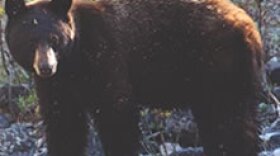Bear sightings across Oregon are increasing, as these large animals are waking up from hibernation, and feeling hungry.
Black bears are especially common across Oregon, and many have a keen sense of smell as well as a voracious appetite.
Beth Quillian of the Oregon Department of Fish and Wildlife told KLCC that bears can smell food up to a mile away, so it’s not surprising some end up in people’s driveways and yards, drawn to garbage cans, compost heaps, bird feeders, and barbecue grills.
“Never feed or approach bears,” advised Quillian. “Because it teaches bears to approach homes and people, and that’s where we end up with conflict between humans and bears.
“Make sure you’re securing your food, garbage, and recycling, maybe even call your garbage provider and ask if they have bear-proof containers available.”

Quillian added that if you see bear activity in your area, to alert your neighbors so everyone can lock up or stow away things that attract the animals.
As for encountering a bear, she said it’s important to just stay calm.
“Back away while facing it. Just make sure you don’t corner it. If they’ve got a way to escape, they’re probably gonna take it.
In the very unlikely event that you are attacked by a bear, Quillian advised not to run, fight back, don’t run, and avoid eye contact with it.
“You can also raise your arms, appear larger than you are. Shout, yell, whistle, clap your hands. And odds are they’re going to get outta there pretty fast.”
Quillian said it’s important not to get bears acclimated to people and homes, as this can create hazards for all involved. In many cases, responding wildlife officials have to put the bear down versus relocating it.
Copyright @2022, KLCC.





